您好,登录后才能下订单哦!
如何进行Java Mybatis中的Mapper原理分析,很多新手对此不是很清楚,为了帮助大家解决这个难题,下面小编将为大家详细讲解,有这方面需求的人可以来学习下,希望你能有所收获。
<dependencies> <!--mybatis坐标--> <dependency> <groupId>org.mybatis</groupId> <artifactId>mybatis</artifactId> <version>3.4.5</version> </dependency> <!--mysql驱动坐标--> <dependency> <groupId>mysql</groupId> <artifactId>mysql-connector-java</artifactId> <version>5.1.6</version> <scope>runtime</scope> </dependency> <!--单元测试坐标--> <dependency> <groupId>junit</groupId> <artifactId>junit</artifactId> <version>4.12</version> <scope>test</scope> </dependency> <!--日志坐标--> <dependency> <groupId>log4j</groupId> <artifactId>log4j</artifactId> <version>1.2.12</version> </dependency> <dependency> <groupId>org.projectlombok</groupId> <artifactId>lombok</artifactId> <version>1.18.2</version> <scope>provided</scope> </dependency> </dependencies>

@Getter
@Setter
@ToString
@NoArgsConstructor
public class user {
private int id;
private String username;
private String password;
}public interface userDao {
List<user> findAll();
}<?xml version="1.0" encoding="UTF-8" ?> <!DOCTYPE mapper PUBLIC "-//mybatis.org//DTD Mapper 3.0//EN" "http://mybatis.org/dtd/mybatis-3-mapper.dtd"> <mapper namespace="dao.userDao"> <select id="findAll" resultType="mode.user"> select * from user </select> </mapper>
核心配置文件
<?xml version="1.0" encoding="UTF-8" ?>
<!DOCTYPE configuration PUBLIC "-//mybatis.org//DTD Config 3.0//EN" "http://mybatis.org/dtd/mybatis-3-config.dtd">
<configuration>
<!--通过properties标签加载外部properties文件-->
<properties resource="jdbc.properties"></properties>
<!--自定义别名-->
<typeAliases>
<typeAlias type="mode.user" alias="user"></typeAlias>
</typeAliases>
<!--数据源环境-->
<environments default="developement">
<environment id="developement">
<transactionManager type="JDBC"></transactionManager>
<dataSource type="POOLED">
<property name="driver" value="${jdbc.driver}"/>
<property name="url" value="${jdbc.url}"/>
<property name="username" value="${jdbc.username}"/>
<property name="password" value="${jdbc.password}"/>
</dataSource>
</environment>
</environments>
<!--加载映射文件-->
<mappers>
<mapper resource="userMapper.xml"></mapper>
</mappers>
</configuration>核心代码
import dao.userDao;
import mode.user;
import org.apache.ibatis.io.Resources;
import org.apache.ibatis.session.SqlSession;
import org.apache.ibatis.session.SqlSessionFactory;
import org.apache.ibatis.session.SqlSessionFactoryBuilder;
import java.io.IOException;
import java.io.InputStream;
import java.util.List;
public class TestMapper {
public static void main(String[] args) throws IOException {
//加载核心配置文件
InputStream resourceAsStream = Resources.getResourceAsStream("SqlMapConfig.xml");
//获得sqlSession工厂对象
SqlSessionFactory sqlSessionFactory = new
SqlSessionFactoryBuilder().build(resourceAsStream);
//获得sqlSession对象
SqlSession sqlSession = sqlSessionFactory.openSession();
//执行sql语句
userDao mapper = sqlSession.getMapper(userDao.class);
List<user> userList = mapper.findAll();
//打印结果
System.out.println(userList);
//释放资源
sqlSession.close();
}
}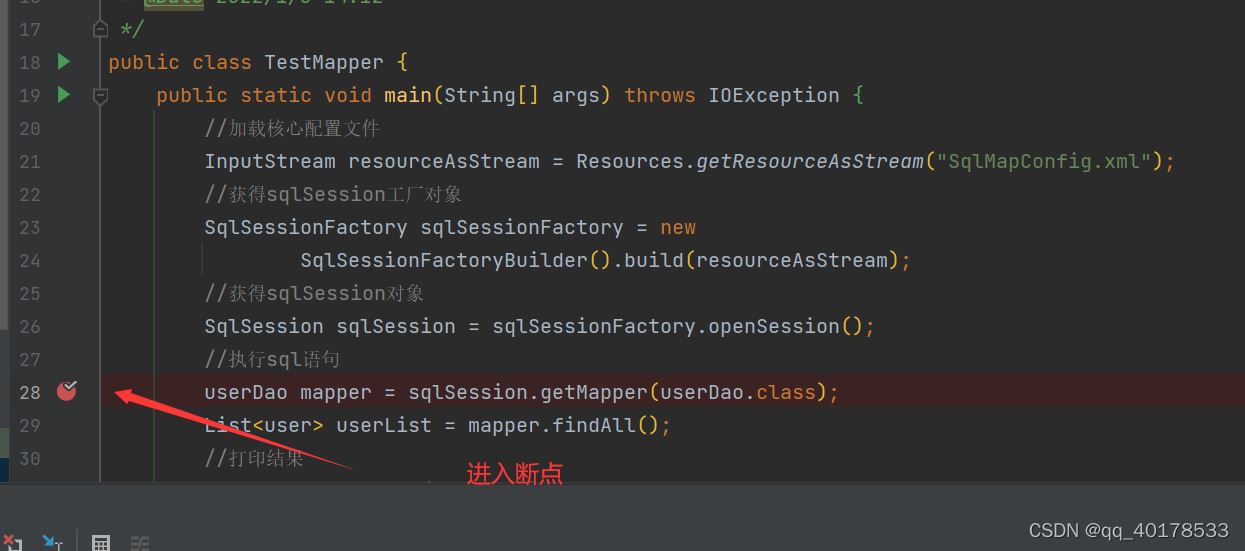
DefaultSqlSession:

Configuration:
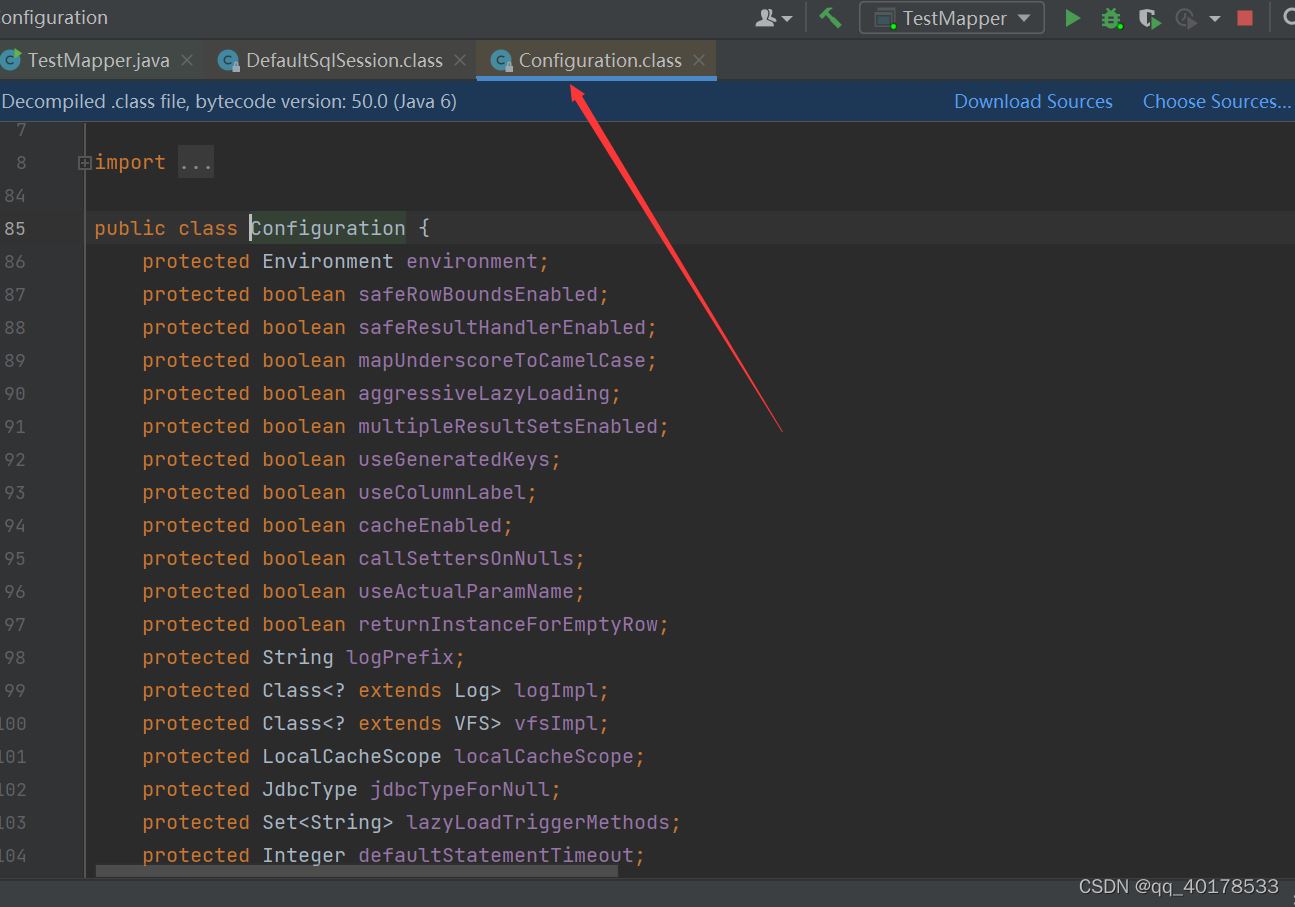
这是Configuration 类。我们主要看getMapper()方法

MapperRegistry:
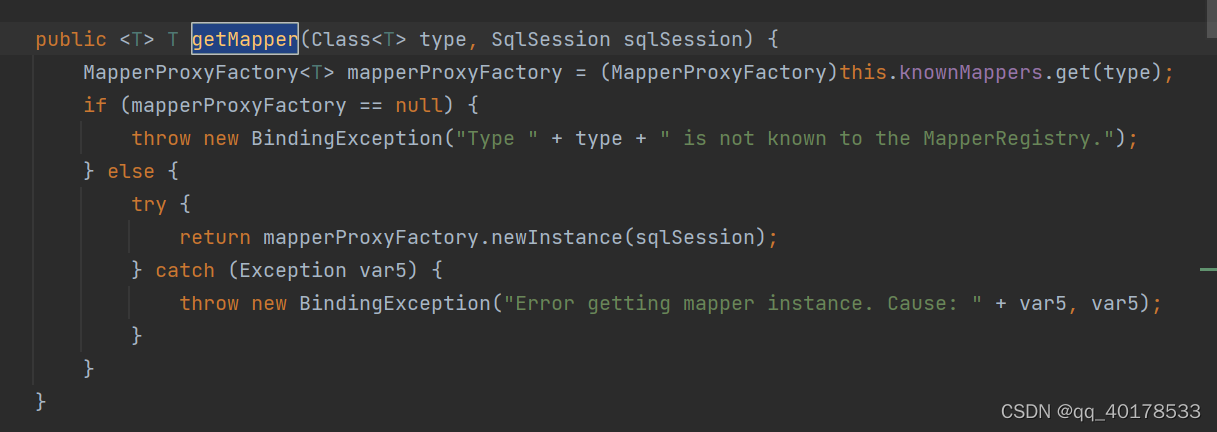
关键代码:mapperProxyFactory.newInstance(sqlSession);
MapperProxyFactory:

返回的是MapperProxy 对象
MapperProxy:
源码:
// Source code recreated from a .class file by IntelliJ IDEA
// (powered by FernFlower decompiler)
//
package org.apache.ibatis.binding;
import java.io.Serializable;
import java.lang.invoke.MethodHandles.Lookup;
import java.lang.reflect.Constructor;
import java.lang.reflect.InvocationHandler;
import java.lang.reflect.Method;
import java.util.Map;
import org.apache.ibatis.lang.UsesJava7;
import org.apache.ibatis.reflection.ExceptionUtil;
import org.apache.ibatis.session.SqlSession;
public class MapperProxy<T> implements InvocationHandler, Serializable {
private static final long serialVersionUID = -6424540398559729838L;
private final SqlSession sqlSession;
private final Class<T> mapperInterface;
private final Map<Method, MapperMethod> methodCache;
public MapperProxy(SqlSession sqlSession, Class<T> mapperInterface, Map<Method, MapperMethod> methodCache) {
this.sqlSession = sqlSession;
this.mapperInterface = mapperInterface;
this.methodCache = methodCache;
}
public Object invoke(Object proxy, Method method, Object[] args) throws Throwable {
try {
if (Object.class.equals(method.getDeclaringClass())) {
return method.invoke(this, args);
}
if (this.isDefaultMethod(method)) {
return this.invokeDefaultMethod(proxy, method, args);
}
} catch (Throwable var5) {
throw ExceptionUtil.unwrapThrowable(var5);
}
MapperMethod mapperMethod = this.cachedMapperMethod(method);
return mapperMethod.execute(this.sqlSession, args);
}
private MapperMethod cachedMapperMethod(Method method) {
MapperMethod mapperMethod = (MapperMethod)this.methodCache.get(method);
if (mapperMethod == null) {
mapperMethod = new MapperMethod(this.mapperInterface, method, this.sqlSession.getConfiguration());
this.methodCache.put(method, mapperMethod);
}
return mapperMethod;
}
@UsesJava7
private Object invokeDefaultMethod(Object proxy, Method method, Object[] args) throws Throwable {
Constructor<Lookup> constructor = Lookup.class.getDeclaredConstructor(Class.class, Integer.TYPE);
if (!constructor.isAccessible()) {
constructor.setAccessible(true);
}
Class<?> declaringClass = method.getDeclaringClass();
return ((Lookup)constructor.newInstance(declaringClass, 15)).unreflectSpecial(method, declaringClass).bindTo(proxy).invokeWithArguments(args);
}
private boolean isDefaultMethod(Method method) {
return (method.getModifiers() & 1033) == 1 && method.getDeclaringClass().isInterface();
}
}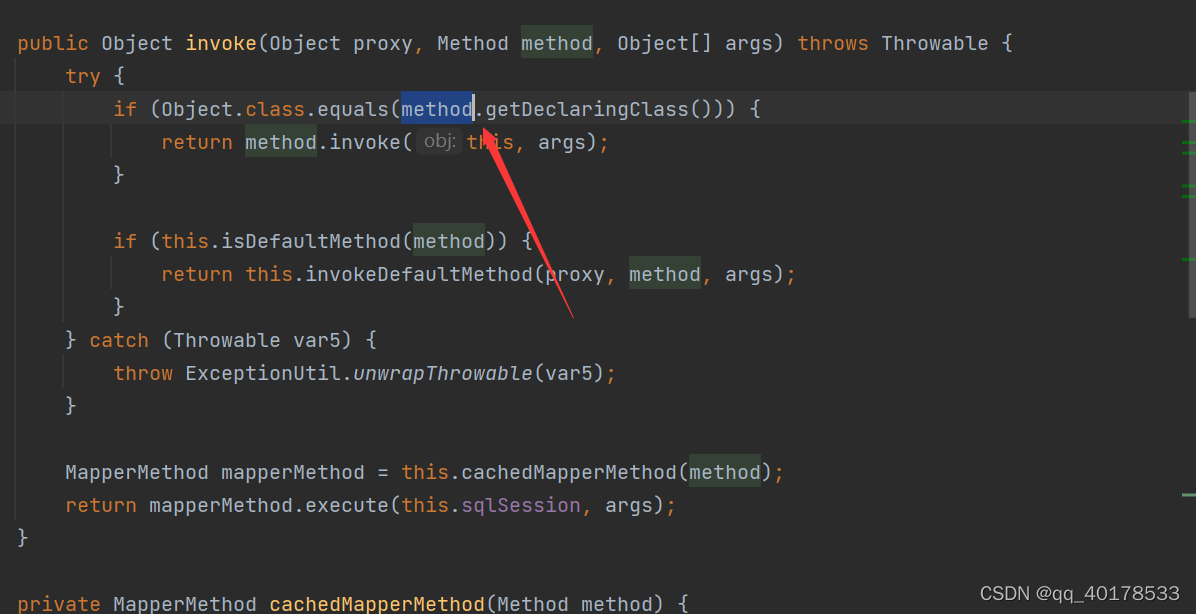
在invoke方法中可以看到,如果我们调用的是Object中的方法,不做任何处理,直接调用,否则执行:
mapperMethod.execute(this.sqlSession, args);
MapperMethod:
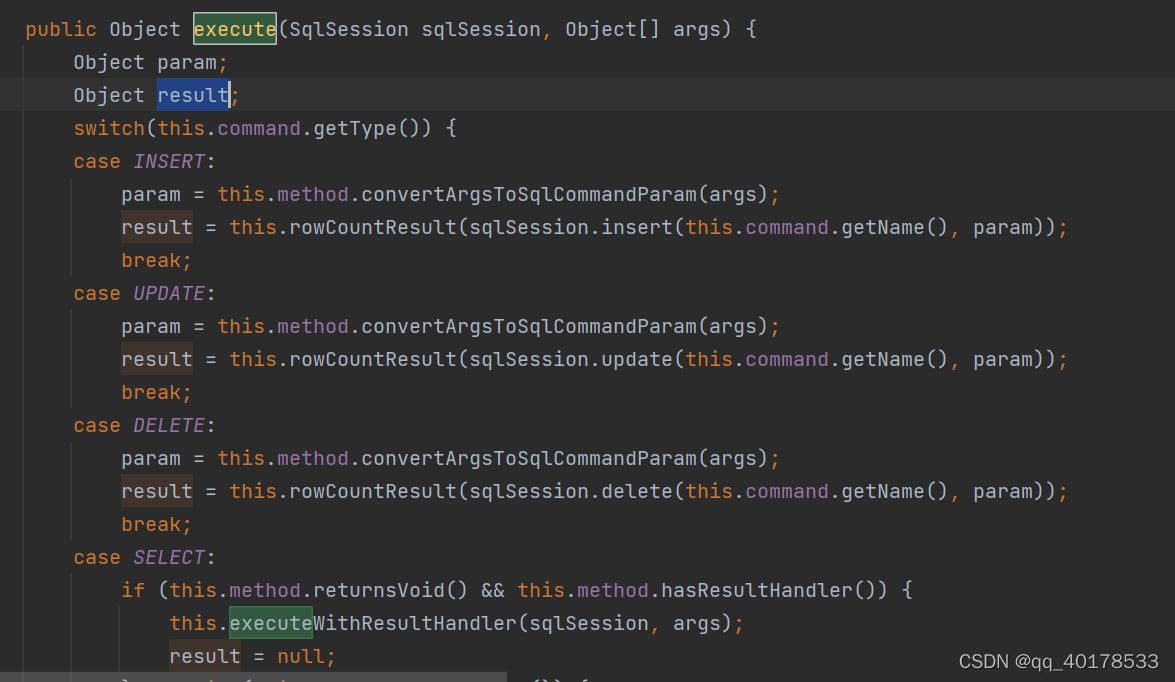
在MapperMethod 中对SQL语句进行分类反射
MapperProxyFactory中,使用JDK的动态代理生成Mapper接口的代理代理类
由动态处理器MapperProxy中调用MapperMethod中的方法处理执行SQL
最后,在MapperMethod中根据执行的方法返回值决定调用SqlSession中的对应方法执行SQL
看完上述内容是否对您有帮助呢?如果还想对相关知识有进一步的了解或阅读更多相关文章,请关注亿速云行业资讯频道,感谢您对亿速云的支持。
免责声明:本站发布的内容(图片、视频和文字)以原创、转载和分享为主,文章观点不代表本网站立场,如果涉及侵权请联系站长邮箱:is@yisu.com进行举报,并提供相关证据,一经查实,将立刻删除涉嫌侵权内容。